#System Design Course Online
Explore tagged Tumblr posts
Text
Tutort Academy
Tutort Academy provides the best data structures, algorithms, system design, data science, artificial intelligence and machine learning courses. Live classes and Guided learnings program by industry experts from Microsoft, Amazon, and top-tier companies. Specially crafted for working professionals.
#AI Ml Course In Bangalore#Machine Learning Course In Bangalore#Ai And Ml Courses In Bangalore#Machine Learning Course Bangalore#Ai Courses In Bangalore#Machine Learning And Ai Courses In Bangalore#Artificial Intelligence Course Bangalore#Artificial Intelligence Course In Hyderabad#DSA And System Design Course#System Design Course Online
0 notes
Text
7+ Best Art Portfolio Website WordPress Premium Theme

Art Portfolio Website WordPress Premium Theme
Creating an art portfolio website is essential for artists, designers, and creatives to showcase their work and attract potential clients. Let’s explore some of the best WordPress premium themes specifically designed for art portfolio websites:
1. Dabble – Creative Agency & Portfolio WordPress Theme:

A sophisticated and stylish theme with multiple menu layouts, sliders, and preset blog post styles.
Features a portfolio system using a custom post type, allowing you to display your projects effectively.
Available in both free and premium versions, with advanced controls in the premium version.
2. Rubrash – Personal Portfolio WordPress Theme:

Known for its rock-solid coding and fantastic support.
Offers full-width portfolio layouts, including checkerboard style and carousel options.
Utilize the drag-and-drop Elementor Builder to create stunning pages for each portfolio entry.
3. Swipy – Creative Agency WordPress Theme:

A flexible and feature-rich theme powered by the Elementor page builder plugin.
Suitable for various types of websites, including art portfolio website.
Explore its extensive library of over 300 templates for startups, freelancers, and personal sites.
4. Kulluu – Creative Agency WordPress Theme:
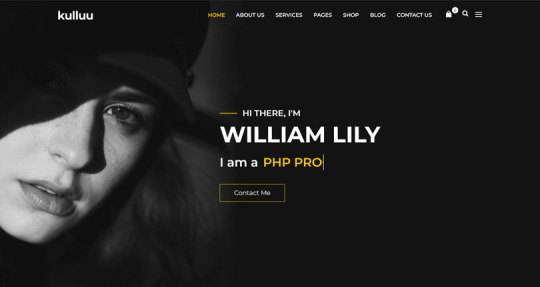
A minimalist freelancer and agency portfolio theme.
Ideal for showcasing your work with a clean and modern design.
5. Bionic- Personal Portfolio WordPress Theme:

Another portfolio WordPress theme that emphasizes simplicity.
Perfect for artists, photographers, and creative professionals.
6. Cretic – Creative Agency WordPress Theme:

A multi-concept artist and creative agency theme.
Offers versatility and a variety of options for different types of art portfolio website.
7. Mifo – Creative Minimal Portfolio WordPress Theme:

A clean and minimal multipurpose theme suitable for art portfolio website.
Focuses on elegant design and typography.
Remember to choose a theme that aligns with your artistic style, provides an excellent user experience, and effectively showcases your work. Happy creating! 🎨🖌️
For more options, you can explore other themes from ThemeForest. Each of these themes has unique features and customization options to suit your specific needs.
#premium wordpress themes#premium wordpress theme#app landing wordpress theme#wordpress premium themes#education wordpress theme#education & online course wordpress theme#paid wordpress themes#consulting business wordpress theme#online learning wordpress theme#wordpress plugins#art portfolio website#Art Portfolio Website WordPress Premium Theme#Creating an art portfolio website is essential for artists#designers#1. Dabble – Creative Agency & Portfolio WordPress Theme:#A sophisticated and stylish theme with multiple menu layouts#sliders#and preset blog post styles.#Features a portfolio system using a custom post type#allowing you to display your projects effectively.#Available in both free and premium versions#with advanced controls in the premium version.#2. Rubrash – Personal Portfolio WordPress Theme:#rubash#Known for its rock-solid coding and fantastic support.#Offers full-width portfolio layouts#including checkerboard style and carousel options.#Utilize the drag-and-drop Elementor Builder to create stunning pages for each portfolio entry.#3. Swipy – Creative Agency WordPress Theme:#swipy
4 notes
·
View notes
Text
Solar PV System Design Course Online - Become an Expert in Solar Power Design
Master the art of solar pv system design course online at Energy Training Group. Learn to design efficient and effective solar power systems with hands-on training and expert guidance. Ideal for professionals seeking to specialize in solar energy, our accredited course provides flexible online learning, empowering you to advance in the booming renewable energy industry. Enroll now and start designing the future of energy!
0 notes
Text
HVAC (Heating, Ventilation, and Air Conditioning) designing in Dubai typically involves a thorough assessment of the building's requirements and specifications, such as its size, occupancy, and usage patterns. This assessment is followed by the selection and sizing of appropriate HVAC equipment, including chillers, air handlers, pumps, and ductwork.
#HVAC Online Training in Dubai#HVAC Training in Dubai#HVAC Course In Dubai#Hvac Online training course#HVAC designing in Dubai#HVAC systems in Dubai
0 notes
Text
Bangalore is a hub for IT companies, startups, and multinational corporations, making it an ideal location to study and work in the field of cybersecurity. The city boasts numerous educational institutions and training centers that offer comprehensive cybersecurity courses to cater to the growing demand for cybersecurity professionals.
#Course Bundles in India#Computer Support in Pune#Cybersecurity Courses in Banglore#Cybersecurity Courses Online#Networking Certifications in Hyderabad#CompTIA Courses Online in India#Microsoft Courses in India#Cisco Courses in Mumbai#Database Systems in pune#Blockchain Courses in Delhi#Programming DevOps in Banglore#Google Certifications in Pune#Google Certifications Online#Cloud Computing in Mumbai#Business & Management in India#Adobe Courses in Mumbai#Design Courses in Pune#Business Productivity in Banglore#Social Media Marketing in India#Microsoft Courses in Online
1 note
·
View note
Text
AlgoTutor Academy: Mastering Data Structures and Algorithms Made Easy
In today's rapidly advancing technological world, data structures and algorithms are crucial in solving complex problems and developing efficient software solutions. Aspiring software engineers, programmers, and computer science enthusiasts are always looking for reliable platforms to enhance their skills. AlgoTutor Academy is a leading online learning platform offering comprehensive data structures and algorithms courses to empower learners with the knowledge and skills required to excel in the competitive tech industry.
0 notes
Text
Calling Ultima the single most consistently groundbreaking, pioneering, influential series of videogames in the history of the medium would be kind of an understatement (Akalabeth and Ultima I pioneering the idea of adapting tabletop RPGs to the medium of videogames in a way that established so many elements that would become intrinsic to the identity of the genre for decades, like the concept of grid-based first person dungeon crawling and tile-based overworld travel, later games establishing the mold for isometric top-down RPGs, Ultima Online being a critical tipping point in cementing the popularity of the MMORPG), but even among a series that consistently pumped groundbreaking videogame after groundbreaking videogame it's just completely impossible to overstate how massive Ultima Underworld's legacy stands over a huge chunk of the gaming medium, even if its effects manifest in subtle ways nowadays like I legitimately believe no individual videogame in the history of the medium has been as influential as it.
It's legitimately insane how many seemingly unrelated videogames can be directly traced back to Underworld in some form or another. Like, to get the obvious out of the way first, it established the DNA of the immersive sim genre, so if you like games like System Shock, Thief, Deus Ex, Bioshock, Dishonored, Prey, all of those games were either made by people who worked on Ultima Underworld (sometimes by the same studio even), or otherwise directly influenced by games that were.
But also, if you like any first person shooters influenced by Doom and other ID Software games? John Carmack was there when the demo of Underworld was first shown and decided he could create a faster texture-mapped first-person 3D engine. Which he did, at the cost of sacrificing true polygonal 3D environments in favor of the pseudo-3D that he would use for Catacombs 3D and Wolfenstein 3D, eventually resulting in the creation of Doom. RPGs like the Elder Scrolls or Gothic? It would take all day to list off how much they directly owe to Ultima Underworld. That videogame trope of finding out what happened to the occupants of a place through finding in-game logs and documents? It was established by Ultima Underworld and popularized by one of its successors.
That's without mentioning how many games directly cite it as an influence. Some already mentioned like Bioshock, Deus Ex, and Elder Scrolls, but also like. Half-life 2? Tomb Raider? Gears of War? Vampire the Masquerade: Bloodlines? All cite it as a direct influence in their game design.
Like of course a lot of these things are by virtue of being one of the earliest free-moving 3D first person videogames, when you're that early in the history of the medium you'll inevitably end up being the first to do *something* that otherwise someone else would eventually have ended up doing anyway, but no other game has a "first videogame to do [thing]" list anywhere as long and important as Ultima Underworld's.
402 notes
·
View notes
Text
So.
Re: tumblr bans of transfemmes.
Let's ignore PhotoMatt for a moment. Manbaby tech CEO doubling down on a stupid decision and making himself look like more of an ass doing so is not a new phenomena.
Tumblr has consistently said, in both public statements and leaked internal communication, that they're essentially running a skeleton crew.
They keep saying that they don't have the resources to moderate, manually review posts, have any kind of appeal process, or anything. So, as people have widely received communications about, they seemed to have automated a significant portion of the moderation to operate solely on the quantity of reports (probably with a basic filter, eg quantity of reports regarding a certain post, within a certain timeframe) to automatically ban or shadowban accounts.
And so, they wipe their hands, both to the users, the public, and their own consciousness, and go about their automated operations.
All of this is likely true. Tumblr, at this point, is essentially abandonware internally, a kind of weird vanity project/dumpster ground for server infrastructure for Automattic. Likely, they don't want the bad press of "shutting down" fully. Or maybe the trickle of revenue they get here just barely exceeds operating costs, so why not keep it around?
Whatever is the case, the bans are a result of an automated process working in the background. I'm giving them some benefit of the doubt here, of course, we can't know anything for certain- but it seems like the individual bans are not based on any specific, manual action.
And that doesn't fucking excuse anything.
Because at some point, multiple people sat down at tumblr, and decided how to cut costs.
And they decided that the bare minimum of report abuse prevention was one of the first things on the chopping block.
Before the boops. Before GUI reconfigures.
They decided to cut something that is necessary to manage online communities.
They decided to cut something that ensures any targeted group will have any kind of community online.
And then, after all of that, the only manual intervention is doubling down on the shitty decisions that the automated systems make, and plucking reasons out of their ass for why they were the right decisions all along.
It's pure silicon valley brain. Blame the computer often and always. Use it to shield the active decisions you made when designing the computer that way. Treat it as a fact of life as opposed to something they actively made decisions for.
Is tumblr staff hitting the banhammer on each transfemme one by one? No.
Is tumblr staff deliberately crafting a system that allows TERFs and other conservative bigots to get rid of the "undesirables" for them? Yup. But they sure as hell are trying to not say the quiet part out loud. If they can always point the finger somewhere else, to the advertisers, to the automated systems, to the TERFs, then they can always have juuusssttt enough plausible deniability.
But being the "queerest place on the internet" requires concious acknowledgement that queer people will be targets of harassment, and you will have to protect against that.
Side note, this is why I do try to keep my blog at least somewhat SFW. Its one of the main reasons why I choose not to reblog all of the posts I'm tagged in- if the post is overtly NSFW, I've probably seen it, appreciated it, and consciously decided my level of interaction with it mostly based on how "tumblr friendly" it is. Is that bowing down to them? A little. It's also my choice. I value the community I have here. The pushes that y'all have given me gave me the strength to transition, and honestly gives me a lot of motivation to research HRT biology as much as I can, among many other things.
Yeah, I post pictures that are clearly meant to be found attractive in ways that are generally not socially acceptable , but never actual NSFW. I would like to think that I'm pretty safe from bans, but hey. Who knows. I don't want to lose my follower base, and the community around it.
And yeah, I'm gonna annoyingly remind you of the other places to find me, make sure to check my pin. If you don't know where to go, just find me on reddit and go from there, I'll post about it if anything happens.
#I hope this rant is at least somewhat intelligible#im in lab late night and typing this out as fast as i can in between experiment steps#stay safe out there yall
1K notes
·
View notes
Text
Blurred Lines: Agency and Victimhood in Gothic Horror
Seeing as Robert Eggers' Nosferatu has just breached a cool $135M at the worldwide box office, it might be as good a time to talk about this as any. I believe I echo the sentiments of most diehard fans of gothic horror when I say this: while we are glad to see this masterpiece meet with well-deserved success, these numbers also mean that a significant proportion of its audience has been previously unfamiliar with the hallmarks of our beloved genre; and the resulting disconnect between the viewers and the source material has been the driving force behind the great majority of the online discourse that surrounds it.
The tools and conventions of the gothic, as a genre, are essential to Nosferatu's primary narrative arc. Its central character, Ellen Hutter, cannot be discussed outside of her literary context. Textually, she balances between heroine and damsel in distress - blurred, in many ways, from mainstream understanding.
That is done entirely on purpose. There are numerous reasons for it; I could go into heavy detail about it; and I will - under the cut, of course.
The main thing I must make absolutely clear (before delving any deeper) is that the gothic genre is fundamentally non-literal. It deals heavily in metaphor, allegory, allusion, obfuscation - and, indeed, the blurred lines that have recently caused so much controversy online. This is by design. It is not a flaw of storytelling or interpretation. The gothic affronts the rigid, black-and-white, mainstream forms of morality because that is what it has always been designed to do; and the newer installments like Nosferatu do the same, being built upon those traditional foundations.
The historical background is therefore essential to the understanding of a gothic narrative. In this, the film does provide the viewer with a relatively easy starting point; its period setting amplifies its connection to its predecessors, as well as the societal pressures and systemic violence that it aims to challenge. It allows the audience to perceive the story through a historical lens that comes pre-installed, as a sort of short-cut to the genre's original social context.
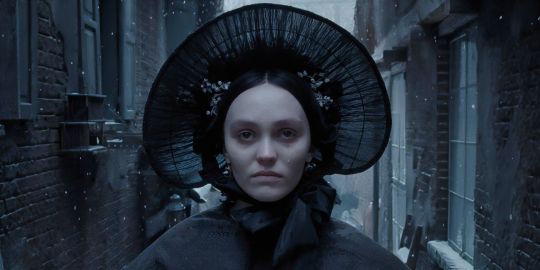
The context, in this case, consists of misogyny, queerphobia, xenophobia, and ableism - which, while rampant even in the modern day, were that much more blatant in 1830s German Confederation, where/when the story largely takes place. Every human character, regardless of who they are, is influenced by these oppressive aspects of their society; and Ellen Hutter is hopelessly entrapped within all four.
Her social situation, as we are given to understand, is precarious. Though she was originally born into wealth, she married down to escape her abusive father. She is an eccentric - her "wild" inclinations (such as having a sense of dignity or loving the outdoors as a child) are enough to cause almost vitriolic disapproval; but on top of that, she was born with a psychic gift, which manifests in a way that is not dissimilar from a mental (and sometimes physical) disability. She and her husband are also English immigrants, and thus perpetual outsiders in Wisborg (this is also one of the reasons Thomas is so anxious to prove himself at Knock's firm, and so keen to emulate Harding in all things); and, finally, she implied to experience queer attraction - which, though non-explicit, repressed, and never truly indulged, still affects her and the way she is continuously treated throughout the film.
Overall, Ellen's existence is perceived, at best, as an inconvenience - and at worst, a scandal. With that, she fits seamlessly into her story's genre.
The "immoral," the forbidden, the taboo is a cornerstone of all gothic fiction. It exists in the doubt between light and dark, harm and desire, love and abuse. It is the domain of sympathetic villains (e.g. Heathcliff, Wuthering Heights), of imperfect victims (Bertha Mason, Jane Eyre), of heroes who are deeply flawed, who cause their own tragedies, and often fail to save anyone at all (Victor Frankenstein, Frankenstein). Within the gothic genre, there are no absolutes; and its contradicting balance of dichotomies provides a reference point - or, more accurately, a cultural triangulation - for exploring the same complexities that a binary puritanical mindset strives to eradicate. These include sexual desire, female autonomy, physical and mental disabilities, classism; in short, anything that gets people wincing.
The popular discussion of these topics is frequently cruel, often avoidant, and rarely straightforward or productive. As stated above, it makes people uncomfortable. It's not pleasant. However, for Ellen (and many people in the real world), it is, quite literally, impossible to avoid. It defines every aspect of her daily life.
What this means for her and for the story is that within a narrative that refuses to gloss over the imperfections of her surrounding society, her victimhood is not thrust upon her by a shadowy figure, emerging from the night. Instead, she is a victim - of an ongoing and systemic, rather than individual, abuse.
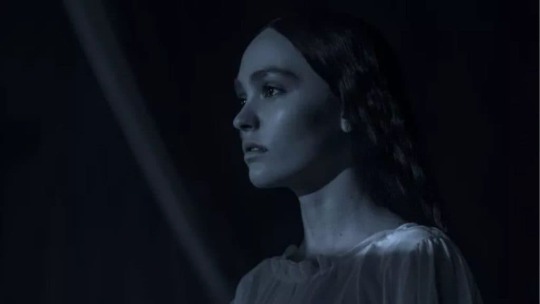
This aspect of Ellen's characterization lies at the core of her behaviour throughout the film. She is an unstable chimera of Brontë's Jane Eyre and Bertha Mason - in the sense that her actions are informed, in great part, by her acute awareness of her own disenfranchisement. She alternates between anguished raving and phlegmatic practicality, used to her pain but unable to entirely ignore it; and, the same way that Jane sees all the rage she feels (but cannot afford to express) manifested in Bertha, Ellen finds her counterpart in Orlok.
This is where the ambiguity begins.
Even though Orlok is most certainly a gothic villain, his relationship with Ellen cannot be interpreted as strictly adversarial. Naturally, it would be easy to ascribe their dynamic to grooming and PTSD; however, as previously mentioned, a gothic narrative is never surface-level - and the film itself never furnishes any information that would definitively limit it to that.
Firstly, to get the primary discourse point out of the way - yes, when Ellen and Orlok first meet within the ether, she is indeed young; and later, she is said to have been a child. However, at the time, the term "teenager"did not yet exist; Ellen's younger self is not portrayed by a child actress; and later, in 1838, she is referred to as a child multiple times - despite being an adult, married woman. Overall, within the film, the term is more often used to describe innocence and inexperience, rather than age; and her initial age is never specified. Granted, a multi-century age gap is not exactly "healthy" anyway - but this is a vampire story. It is per the course; and it complicates their relationship beyond a simple victim vs abuser narrative.
Secondly - and perhaps, most importantly - the overall impact of Orlok's coercion tactics falls flat in comparison to Ellen's human-world alternatives. Yes, he argues and threatens; but her social circumstances have never allowed her agency in the first place. Her father abuses, isolates, and threatens to institutionalize her; Thomas dismisses her concerns as "childish fantasies"; Harding and Sievers tie her down and drug her; Harding again kicks her out of the house. Her marriage, her friendships, are therefore all transactional; they grant her an escape from her father's house, relative financial stability, social support - on the condition that she represses her true self, pretends to be normal, doesn't threaten anyone's masculinity or heterosexuality, and acts like she's happy to be a deferring, obedient, settled wife. Being a daughter of a landed gentleman, she would never have been given a working woman's education, and evidently has no income of her own; and so, she has no options except to upkeep her end of the bargain - which means that her continued survival within mainstream society relies on constant background coercion.
Compared to this mundane, socially acceptable horror of her existence, the vampire actually offers her more autonomy than she is ever otherwise accorded. The terms of his covenant never threaten Ellen's own well-being; so on one hand, she has benevolence - and on the other, the dignity of choice.
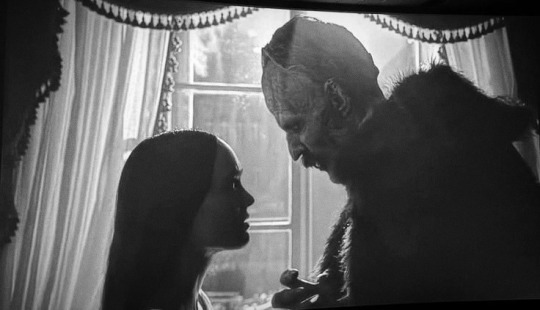
This contrast lies at the heart of her dilemma. Ellen is torn between what she believes she should be and what she knows - and Orlok knows - she is.
One is "correct," moral, Good; the other is "wrong," sinful, Evil. However, at the same time, the first is manufactured; it is artificially designed, and must be continuously enforced. The second is primal. Natural. In accordance with gothic tradition, the appeal of Orlok is that he is forbidden, yet instinctive. By design, he is a reflection of everything that Ellen is forced to repress on a daily basis. That includes her rage, her ostracism, her abnormalities; but also, her desperate need to be respected, understood, and desired. He is both grotesque and alluring, both a lord and a beast, both cruel and reverent.
"He is my melancholy!.." cries Ellen.
"I am Heathcliff!" whispers Cathy.
Still, while Cathy and Heathcliff are primarily divided by class and racism, Orlok and Ellen are separated by moral considerations. In the explicit sense, Ellen cannot choose the Evil that Orlok represents. Within the surface narrative, she is obligated by her society, her morals, and the story to choose Good - in this case, by nobly sacrificing her individual expendable life to save her husband and a city full of people. Her primary storyline, like everything else, has already been decided for her.
For the Trekkies among us, this is Ellen's own Kobayashi Maru. A no-win scenario. As such, within the context of character analysis, her destination does not matter as much as the little things she does along the way; and it is no accident that, as the film progresses, the subtler, seemingly insignificant choices she makes within that framework just happen to bring her closer - and closer - to Orlok.
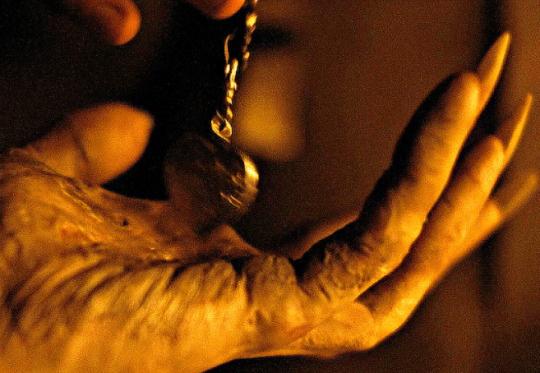
All of them are just innocuous enough to almost pass. She places a lock of perfumed hair in a locket that she gives to Thomas - and upon his arrival to the Carpathians, the same locket is immediately claimed by Orlok, who recognizes the scent of lilacs. Before making her sacrifice, she puts on her wedding dress and finds a bouquet of the same flowers - which is the sort of effort she didn't have to perform, especially given that he cannot resist her blood regardless. When Orlok arrives, she chooses to undress them both, and leads him to the bed, even though her previous sex scene with Thomas was entirely clothed; and in the morning, she pulls him close and holds him through the sunrise - even though he was already dying, and would not be able to escape. There was no need for her to touch his rotting flesh at that point, much less caress it.
There can be a "moral" explanation for all these actions; but the lack of direct obligation involved in them becomes increasingly blatant over the course of the story, and the doubt festers.
This sort of lingering ambiguity is precisely where gothic horror thrives - and intersects, scandalously, with romance. Gothic horror, much like bodice-ripper novels, noir thrillers, or "dark romance," builds much of its romantic intensity on the dichotomy of shame and desire. Imagine it, if you will, as a loom; warp and weft. It may even be described as literary BDSM - a continuous, mutually-agreed-upon act of roleplay between the author and their audience, and sometimes the characters themselves (though that depends). The point is to create an outlet for female, queer, or disabled sexualities, all of which are still heavily medicalized and restricted, derided, or denied entirely; and within these often intersecting genres, the violent or coercive intensity of the dominant lead (be it a vampire, a mafia don, or simply a more experienced lesbian) provides their repressed, seemingly passive counterpart an excuse to act upon their demonized erotic urges.
Between the page and the mind, everything that normally complicates a romantic or sexual encounter in the real world (subliminal hints, aggression, repressed and involuntary responses) becomes set dressing - serving to place a particular scene or dynamic within its fictional universe. The resulting Watsonian uncertainty is, naturally, part of the appeal. It is what allows the viewer/reader/listener a sincere emotional and sensual immersion; and for Ellen and Orlok, it provides an appropriately dramatic pretext for a night of tender vampire sex.
The discourse around their joining is painfully similar to the same that drifts around online every winter - in regards to the classic holiday hit, Baby it's Cold Outside. The song, written during an era in which extramarital sexuality was heavily restricted, follows a couple brainstorming excuses for the lady to stay the night; this intention was explicitly stated by both members of the original duet; but that hasn't stopped thousands of people from interpreting it as a "rape anthem." It is unsurprising, then, that an element of horror (guilt, shame, repression, coercion) muddles the water even further.
It's oddly apt, considering that the film premiered on Christmas Day.
Granted, I am not denying that there is an abusive aspect to Ellen and Orlok's connection, romantic or otherwise. However, to reduce Ellen to merely his "victim" is extremely inaccurate to her actual portrayal - because, within the framework of the film, her interactions with Orlok are the few in which she is actually able to exercise some form of agency. She never defers to him, their wedding-death hinges on her free will, as coerced as it may appear; and, in a fascinating subversion of a popular vampire trope, she is the one who summons him.
In gothic media, "Come to me!.." is invariably spoken by a vampire (or a vampire derivative like Erik, Leroux's titular Phantom of the Opera); their counterpart follows helplessly, without question; and giving these lines to Ellen is a dramatic deviation from tradition that fundamentally alters the underlying context of their power balance. By maintaining this call-and-response dynamic throughout the story, Eggers asserts that Ellen isn't helpless; and neither is she "in over her head." She is intelligent, powerful, and she has a tangible influence over Orlok, who is her only equal - which is why, ultimately, she is the one deciding where that relationship is headed.
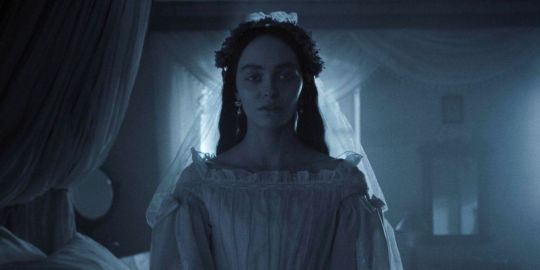
That is not to say that any alternative readings of the film are entirely incorrect. As I have stated above, the abusive/toxic narrative is definitely present, and even essential, in gothic media. On the Doylist level, it is the equivalent of a whip, or a solid pair of cuffs - essentially, a divestment of responsibility; though, to continue the metaphor, not everyone shares the same kink - and those who do might not all enjoy it the same way, so there's definitely significant variation. What I am trying to say, however, is that each story does come with a central conflict; and Ellen Hutter's victimization - much like Jane Eyre's, like Thomasin's (The Witch, 2015) - is systemic.
She is ostracized, disrespected - infantilized if her oppressors are feeling benevolent, demonized when they are inconvenienced - and still expected to always prioritize her husband/friends/community by default, regardless of how she is treated by them. Her surrounding society, morality, religion, culture all insist upon the same; and this is why, despite knowing that she has done nothing wrong by following her nature, she carries an enormous amount of guilt in regards to those "unacceptable" aspects of herself. It is also the same reason why Orlok - the sensual, cruel, utterly devoted monster - is the answer to her lonely call; and the reason why everyone around her is so eager to see her as his victim, rather than a victim of anything they may have perpetrated themselves. Ellen's is a rich complexity, fed upon centuries' worth of gothic tradition, and she cannot be forced into a flat, genre-inappropriate simplification.
Like The Witch, like NBC Hannibal, like Interview With the Vampire before it - Nosferatu (2024) is a story of self-indulgence being so unfamiliar that it feels like a sin; or, like dying.
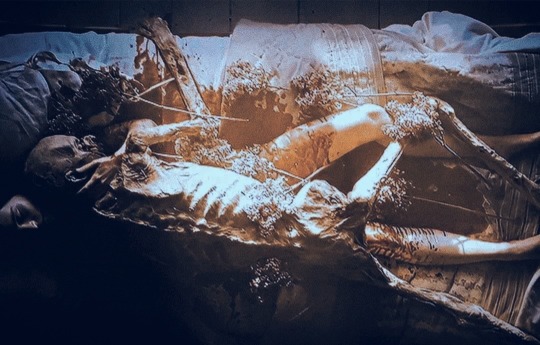
I, for one, would not deny her that.
#nosferatu#nosferatu 2024#nosferatu (2024)#ellen hutter#count orlok#lily rose depp#bill skarsgård#robert eggers#nosferatu movie#robert eggers nosferatu#nosferatu meta#ellenorlok#ellen x orlok#gothic fiction#gothic horror#gothic romance#horror film#horror film analysis#gothic art#wuthering heights#jane eyre#frankenstein#gothic film#vampire#vampires#vampire fiction#vampire movies
244 notes
·
View notes
Text
Free-To-Use Wolf Base!
WAH THIS WAS SO MUCH WORK BUT IT'S READY!

I put together this pic to showcase some of the different features available. Most of them are quite subtle, so you'll have to see for yourself!
The file currently includes a summer and winter coat base, four ear variants, four snout variants, and a variety of facial expression options. All head features are available on the headshot as well as the fullbody, and all features are compatible with both the summer and winter bases, so you can mix and match!
There's also two sets of text boxes, two palette options, and some public domain photograph backgrounds to pick from.
I'd like to expand it further in future, but I'll be taking a breather first. It's been a lot of work making this! Worth it though, I think. ^^
Rules of use
This base is free to use for any non-commercial purposes which don’t involve the use of generative AI. You may not use this base for profit, advertisement, or commissions without my clear, written permission. You may not use any generative AI tools at all in relation to this base. Doing either of these is a violation of my legal ownership of this work.
If you want to share the base, you can – however, you must do so by sharing a link to this tumblr post. You may not post a link to the file directly, or reupload it to share online under any circumstances.
You must keep my signature clearly visible. By alpha locking the layer, you can recolour it dark or light to be visible on your background of choice. It can be in any location and colour, as long as it is visible and the text is legible without effort. You may not claim the base as your own, but any designs made with it are entirely yours of course!
If you post work using this base anywhere online (including on discord or art apps), you must include a link to my tumblr account as credit for the base – preferably a link to this post specifically.
You may modify the base to your heart’s content, as long as generative AI is not used at any point in the process and my signature is unaltered and visible.
I am willing to add extra features to the base in exchange for a fee. I am planning to make expansions to it on my own time as well, but these will specifically be realistic features and I’m not sure on a timeframe. You may not make requests for free additions. If you want a fantastical feature added, or want an addition made sooner, get in touch and we can work out a price! Features added in this way will be made available for everyone unless otherwise agreed.
Anyone is free to use this base. If you are blocked by my tumblr account, you are allowed to log out or visit the site on a private browser to access the base. However, note that I am openly and passionately supportive of endogenic plurality and all kinds of endo systems and if you have a DNI rule regarding pro-endos or endogenic systems, you will be violating that DNI by interacting with me or my work. You may want to consider blocking me if so.
Support and tips
If you want to support my work (and help motivate me to keep working on this base and create more in the future), there’s two ways I absolutely appreciate!
The first is simply to spread the word! I made this base as a free resource, in the hopes that fellow artists, therians, alterhumans and furries would enjoy it and find it useful. Reblogs are vastly appreciated!
If you wish to provide some kind of financial support, I do accept tips – but not in the conventional way! I ask that, instead of sending money to me, you make a donation to the Endangered Wolf Center on my behalf. Red wolves and Mexican wolves are both critically endangered, and with the current political climate of the US, supporting conservation efforts to preserve and save these unique keystone species is more important than ever. If you do decide to donate, I would love if you told me!
Extra info
More info, including photo sources, can be found in the text doc included in the zip file! I also included a bit of basic advice for using the base, so give it a read over if you're unsure about anything. If you're still stuck, you can message me!
File download here!
#free to use#free base#free ref base#wolf base#wolf ref#wolf art#art base#ref sheet#digital art#tumblr tags are hard aaaaaaaaaaaaa#anyway sure this is probably fine whatever#i hope people like and use this [screaming]
134 notes
·
View notes
Text
Tutort Academy
Tutort Academy provides the best data structures, algorithms, system design, data science, artificial intelligence and machine learning courses. Live classes and Guided learnings program by industry experts from Microsoft, Amazon, and top-tier companies. Specially crafted for working professionals.
#AI Ml Course In Bangalore#Machine Learning Course In Bangalore#Ai And Ml Courses In Bangalore#Machine Learning Course Bangalore#Ai Courses In Bangalore#Machine Learning And Ai Courses In Bangalore#Artificial Intelligence Course Bangalore#Artificial Intelligence Course In Hyderabad#DSA And System Design Course#System Design Course Online
0 notes
Note
you were on cohost? i guess too late now, how was it for you?
cohost had its fair share of problems and i could often find the community there a bit too tumblr-core fingerwaggy if you know what i mean. but the site's dead now so it's kind of a moot point. what i find myself reflecting on most these days are the positives.
first, no numbers. i think their no numbers policy was probably a bit over-aggressive, but it quelled some of the rat race popularity contest aspect of social media that often makes it so tedious. i liked their tag tracking system, their robust content warning options, and the absence of infinite scroll. what i miss most about cohost is that their text editor supported CSS, which led to people programming elaborate text effects and puzzles and games in-site that harkened back to the days of flash animations. there was something in this combination of elements that drew out a rebellious creativity in users.
cohost came at a time when social media was across the board feeling terrible (and it's only gotten worse hahaha), particularly as someone who makes shit that relies on you clicking links that take you away from the website or app. algorithms hate this and punish it. users also just seem kind of lazy and disinterested in using the internet so much as letting the internet happen to them passively. but when a post of mine went viral on cohost, people engaged with it. it wasn't just likes and shares, it was comments and additions. it felt like a place that (at its best) encouraged actual conversation and the development of new ideas among like-minded peers. when my posts did well and i included a donation link, people gave me money. it felt genuinely like a website that COULD support professional blog work in a way that was more customizable even than substack yet still RSS friendly, and the Following tab which let you easily see posts of specific users was a REVELATION, like a mini RSS reader within the website itself.
but the enterprise was unsustainable for various reasons (not all of them outside the dev crew's control) and the haters got what they wanted. now our big social media alternative is bluesky, a website that dares to ask the question "what if there was another twitter?" the answer is that it fucking sucks. i hate microblogs so much dude, why on EARTH are we still acting like these disambiguited 300-character-limit posts are the most preferable means of social communication online??? why would you set out to make a better twitter and then deliberately choose to replicate literally every aspect of the user experience that encouraged low-information high-drama conflict fabrication? WHY WOULD YOU MAKE A VERSION OF TWITTER WHERE YOU CAN EASILY LOOK UP THE ACCOUNT OF EVERYONE WHO HAS YOU BLOCKED AND IT'S SUPPOSED TO BE A FEATURE NOT A BUG???????? i just don't get it. i don't even get the optimism of the early adopters. i've seen people decry the post-election decay of the platform like "of course the cishets come in to ruin a community that was defined by trans & queer people" i'm sorry HELLO???????? from literally day zero bluesky was aiming to be a hands-off centrist IPO-friendly tech startup, there was never anything structurally embedded within the platform itself to keep this kind of decay from happening, you just happened to be on there when there were dramatically fewer users most of whom were curious tech enthusiasts. seriously, how have we not learned this lesson yet? you can't define a digital culture by the vibes of random user behavior! unless you have LAWS and GUIDELINES whereby you fucking BAN people for being shitheads, unless you enforce an actual code of conduct and punish bigoted speech and design a system that encourages constructive conversation, you are always always ALWAYS going to wind up at unhinged facebook boomer slop!
the death of cohost and the utterly predictable decay of bluesky are a big part of the reason why i've been posting so much more on tumblr. this is like the last bastion of anything even remotely resembling the old web, with its support of longposts and tagging and how easy it is to find random hobbyists doing cool shit you never knew existed before. like, yeah, you have to search that shit out and tailor your feed to not drive you crazy, but that's what i like about it!!! i am an adult with agency who understands that life is complicated and as such i expect to have to put some work into making my experience with a website positive! but in the hellworld of the iphone everything is walled garden apps for aggregating content where the content and its creators are structurally established as infinitely replaceable and uniquely worthless punching bags to be used and cast aside. everyone's given up on moderation and real jobs don't exist anymore especially if you happen to work in the "creative economy" IE are a writer or critic or artist or hobbyist of literally any kind. we've given up on expecting anything from the rich moneyboys who own and profit immensely off of the platforms whose value we literally create!!! especially now with the rise of "AI" grifters, whose work has ratcheted good old fashioned casual sexism and racism and homophobia up to levels not seen in such mainstream spaces since the early 2000s.
i like tumblr because i don't have to use a third party app to get & answer asks at length, and because it is a visual artist friendly platform where i won't be looked at funny for reblogging furry postmodernism or transgender homestuck OCs. it is a site that utterly lacks respectability and that's what makes it even remotely usuable. unfortunately it also sucks! partly it sucks because this place was ground zero for the rise of puritanical feminist-passing conservatism in leftist spaces, so it's like a hyperbolic time chamber for brain-melting life or death discourse about the most inconsequential bullshit you could ever imagine. but it also sucks because it's owned by a profit-motivated moneyboy who has consistently encouraged a culture of virulent transphobia and frequently bans trans women who call this out. so like, yeah, this place is cool compared to everywhere else, but it is exactly like everywhere else in that is also on a ticking clock to its own inevitable demise. the owners of this website will destroy everything that makes it interesting and will EAGERLY delete the nearly twenty years (!!!!!!) of posts it's accumulated the instant it will profit them to do so. this will be immensely unpopular and everyone will agree it's a tragedy and it won't matter. the culture and content of a social media platform is epiphenomenal to its rote economic valuation. i mean, obviously it isn't, zero of these massive tech companies would be what they are if so many people weren't so eager to give their time and labor away for free (and yes, writing a dumb dick joke on tumblr IS a form of labor in the same way that doing a captcha is labor, just because it's a miniscule contribution in an economy of scale doesn't mean you didn't contribute!), but once a tech company reaches a certain threshold its valuation ceases to be tethered to anything that actually exists in reality.
all of which is why i remember cohost with a heavy heart. yeah, it was imperfect. it was also independently owned, made with the explicit goal of creating a form of social media that actually tries not to give you a lifelong anxiety disorder so it can sell you homeopathic anti-anxiety sawdust suppositories. for the brief window of time when it was extant, i was genuinely hopeful for the future of being a creative on the internet. part of why i spend so much time on godfeels, a fucking homestuck fanfiction with no hope of turning a profit or establishing mainstream legitimacy, is that my readers actually ENGAGE with the material. what brought me back to using this website consistently was precisely the glut of godfeels-related questions i got, and the exciting conversations that resulted from my answers. meanwhile i put so many hours into my videos and even when they do well numerically, i barely see any actual engagement with the material. and that is a deliberate design choice on the part of youtube! that is the platform functioning as intended!! it sucks!!!
what the memory of cohost has instilled in me is a neverending distaste for the lazy unambitious also-rans that define the modern internet. i remember the possibility space of the early web and long for the expressiveness that even the most minor of utilities offered. we sacrificed that freedom for a convenience which was always the pretense for eventually charging us rent. i am thinking a lot these days about what a publicly funded government administrated social media utility would look like. what federal open source standards could look in an environment where the kinds of activities a digital ecosystem can encourage are strictly regulated against exploitation, bigotry, scams, and literal gambling. what if there was a unionized federal workforce devoted to the administration of internet moderation, which every website above a certain user threshold must legally take advantage of? i like to imagine a world where youtube isn't just nationalized but balkanized, where you have nested networks of youtubes administrated for different purposes by different agencies and organizations that operate on different paradigms of privacy and algorithmic interaction. imagine that your state, county, and/or city has its own branch of youtube meant to specifically highlight local work, while also remaining connected to a broader national network (oops i just reinvented federation lmao). imagine a world where server capacity is a publicly owned utility apportioned according to need and developed in collaboration with the communities of their construction rather than as a deliberate exploitation of them. our horizons for these kinds of things are just so, so small, our ability to imagine completely captured by capitalist realism, our willingness to demand services from our government simply obliterated by decades of cynical pro-austerity propaganda. i imagine proposing some of this stuff and people reacting like "well that's unrealistic" "that'll never happen" "they'd just use it for evil" and i am just SO! FUCKING! TIRED!!!!
like wow you're soooooo cool for being effectively two steps left of reagan, i bet you think prison abolition and free public housing are an impossible pipedream too huh? and exactly what has that attitude gotten you? what've you gained by being such a down to earth realist whose demands are limited by the scope of what seems immediately possible? has anything gotten better? have any of the things you thought were good stayed good? is your career more stable, your political position more safe, your desire to live and thrive greatly expanded? or do you spend every day in a cascading panopticon of stress and collapse, overwhelmed to the point of paralysis by the sheer magnitude of what it's cost us to abandon the future? you HAVE to dream. you HAVE to make unrealistic demands. the fucking conservatives have been making unrealistic demands forever and look, they're getting everything they want even though EVERYONE hates them for it! please i'm begging you to see and understand that what's feasible, what's reasonable, what's realistic, are literally irrelevant. these things only feel impossible because we choose to believe The Adults (and if you're younger than like 45, trust me, to the ruling class you are a child) whose bank accounts reflect just how profitable it is to convince us that they're impossible. all those billions of dollars these fuckers have didn't come from nowhere, it was stolen from all of us. there is no reason that money can't and shouldn't be seized and recirculated back into the economy, no reason it can't be used to fund a society that is actually social, where technological development is driven not by what's most likely to drive up profits next quarter but by what people need from technology in their daily lives.
uh so yeah basically that's my opinion of cohost lmao
#sarahposts#cohost#social media#politics#long post#political diatribe#i miss cohost#this is what happens when my ritalin kicks in mid-stream#i promise i didn't MEAN to make this a whole Thing#but i've been thinking a lot about this stuff and cohost is a big part of why
111 notes
·
View notes
Note
hey could you please tag true crime especially the katie pladl post i did not need to see that
I sense you are new here — everyone is warmly welcome. However, it’s important to understand that this blog, millenniallust4death, is entirely for myself. I’m a deeply sad person with a dead family. It’s fair to say that disturbing and uncomfortable topics appear here regularly.
Katie Pladl was a real person, and I’d been thinking about her all day. Her story wasn’t "true crime" to me — it was about the quiet weight that comes from watching someone disappear from public consciousness. It was about grief and memory, because another young woman was murdered by a man when she tried to establish boundaries. It’s a reminder of how one decision can dramatically alter the course of a life.
Katie’s life ended at 20 years old before she had a chance to live, and I wanted to sit with a stranger’s memory. This desire shouldn’t come as a surprise from the person known on Tumblr for a photo of her dead husband and his dog.
I consistently tag every post, but the system is personal and not designed for audience navigation. I think curating your online experience is essential — but that doesn’t mean trying to control what strangers post on their blogs. It means using the unfollow button, the block button, and knowing when to quietly step away. YOU make the choices about what you read, not an algorithm. It’s why Tumblr dot com remains the best social media experience.
I hope new folks stick around — the community we’ve built here is amazing. But it also comes with uncomfortable conversations.
65 notes
·
View notes
Note
a ttrpg for teenagers going on an I'll advised roadtrip?
THEME: Teenage Road-trip
Hello there! I've got games about teens and games about road-trips: I'm sure between all of these you'll find the right fit!

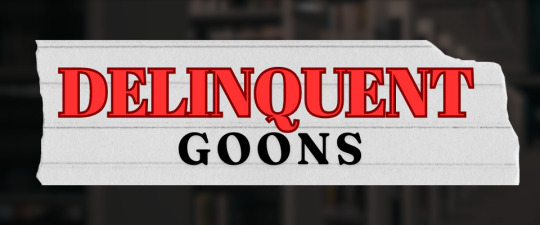


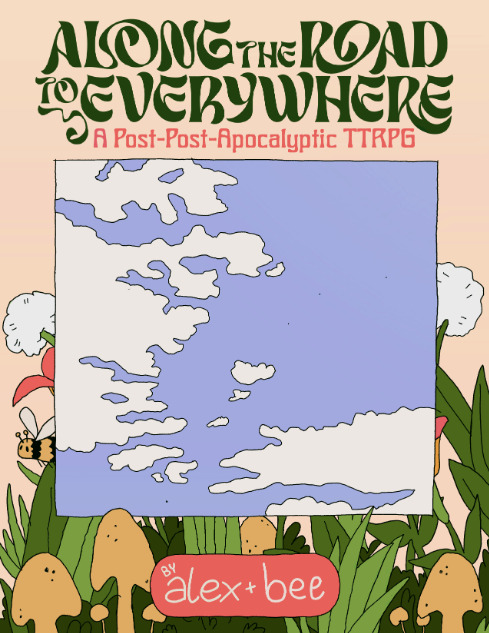


Along The Open Road, by Thorne.
Are you ready to head on a Journey Along the Open Road?
Along the Open Road is a simple road trip storytelling TTRPG that allows a group of 3-5 players to work together to tell the Journey of a group heading down 'The Open Road', discovering new Stops along the way, learning about cool Points of Interest, and meeting Unique Characters.
And the best part of all of this? Your group creates the story you want to tell.
Along the Open Road, as a storytelling TTRPG, is a game that allows every one of the players to be in command of the story at some point. There is a great focus on Characters, of course, but there's as great of a focus on Players, too. And just in case there are Players who aren't as experienced in storytelling or running sessions as others, there's a whole host of ideas tables right at the back of the book.
Along the Open Road is a road-trip game before anything else. This means that you can decide the setting and circumstances that will affect your characters: it cares about your car, your cash, your inventory and the journey you go on. Advice in the game also seems to hint towards holding at least one session per character in order to experience the fullness of the game, which tells me that the game likely also allows you to dig into emotional depth if you so desire. Because it's kind of setting-agnostic, I do feel like you can play teens in this one, although there won't be anything that makes them distinctively teen-like compared to other possible characters.
Delinquent Goons, by Veri.
Delinquent Goons is a system hack of the Tunnel Goons system submitted to the One Page RPG Jam 2024. Designed for playing with 1 Narrator and up to 4 players aka Delinquents.
Explore a time when everybody expected you to behave a specific way, grow up at a specific time, and only exist in specific spaces. And reject all of that. Form a ragtag group of teenage dirtbags as they reject expectations set upon them and uncover the covert conspiracies of authority figures and classmates.
Delinquent Goons is inspired by media such as Scooby Doo: Mystery Incorporated (among others), so I think putting a bunch of teens in a van and sending them off to deal with strange happenings is totally in its wheelhouse.
I think the piece of the game that is the most emblematic of teenage themes is the Peer Pressure gauge, which is meant to represent the stress or dread of being a teenage delinquent. Your teen doesn't just have to deal with the threats against the group, they also have to manage the pressure of having to live up to a certain social expectation in their group of friends. Despite the core game rules of Delinquent Goons being rather simple (it is, after all, using the same engine as Tunnel Goons), the Peer Pressure gauge gives your group a tool by which you can imbue your story with drama and emotion.
Interstate 10 1/2, by PsychHound. @psychhound
The van is gassed up. The tunes are playing. The road is clear.
Well … the van is running on something, the tunes keeping remarking on achingly specific details of our travels and inner thoughts, and the road is clear of other cars but nonetheless something keeps cropping up in the rear-view that looks different to every person who gazes upon it.
But, that’s, uh … normal for a roadtrip. Right?
In Interstate 10 1/2, you and your friends will hit the road in a possibly-alive van, working hard to keep everything in operating shape, keep food on your plates, and not let your fellow road-tripper's fascination with the possum who has his same eyes freak you out too much.
Interstate 10 1/2 is a short 2-page game by Luka Brave, also known as PsychHound Games online. It uses his Horseshoe System, which centres around two tracks that help keep the story moments punchy with a peak and a nosedive in the fiction attached to when your characters succeed and fail.
Character creation is simple, but it isn't limiting: the tables that help you put your little blorbo together offer short, evocative phrases that demand that you add emotional depth to your backstories. You don't have to be a teenager in this game if you don't want to be, but you can absolutely start with the premise that all of the folks on this road-trip are young, and perhaps a little bit foolish, and Danger is sure to follow you regardless.
The Book of Brushwood Lullabies, by Hex Culture.
The Book of Brushwood Lullabies is a tabletop RPG made for the time of year when seasons turn and leaves change color. Play as a group of wayward children as they attempt to navigate and their way through the strange and wonderful Brushwood. Make friends along the way, avoid enemies, stray from the path, and (with a little help from fate) find your way back home.
This game is best with 3-5 players, and requires both a set of tarot cards and polyhedral dice for full enjoyment.
Inspired by media such as Over The Garden Wall and Tales From The Loop, The Book Of Brushwood Lullabies appears to aim for somewhere between the magical and the surreal. It isn't really a road-trip per se, but it does carry the pieces of a travelogue that you might be looking for from a road-trip story. Your kids are trying tog et back home, through a woods that harbors witches, magical creatures, and a scarecrow looking for his items of power. To add to the feeling of enchantment, the game uses a deck of tarot cards to create unique abilities for each character, as well as a mechanic that involves reading a 3-card spread to interpret what happens in a scene.
If you want a highly interpretive game, I recommend The Book of Brushwood Lullabies.
Along the Road To Everywhere, by loamington.
ALONG THE ROAD TO EVERYWHERE is a post-apocalyptic road-trip tabletop role-playing game. It sets the aesthetics and ideals of the Beatnik and Hippie movements of the mid 20th century against the backdrop of a vast, magical wasteland. It’s relatively low-key and role-play focused, dealing with ideas of community and regrowth. Part of the idea is to tell the stories that happen between larger stories—between dots on the map.
Branding itself as a rules-lite game, Along the Road to Everywhere embraces the themes of a road-trip by classifying the GM as the Engine, and the players as the Passengers. The game claims inspiration from Art Nouveau, Medieval Revival, Beatnik & Hippie culture, and Transcendentalism. I'm not familiar with most of these sources, so I'm not sure how much of those inspirations shine through in this game, but the idea of an art & cultural movement feels like it might be in tune with teen culture, if you don't mind blending genres a little bit.
The setting for this game is both post-apocalyptic and medieval in nature, with vans that are powered by plants instead of gas, and a world that's meant to be built collaboratively with some suggestions for beautiful and vibrant locales. I think the biggest dissonance with this game and your request is the part about "ill-advised" road-trips. The trips in this game don't feel very creepy: they're dangerous, but the aesthetic of the game takes a turn more towards the hopeful than anything else.
Wayward Highway, by Capacity for Wonder.
Civilization is a strange web; places strung together with highways and telephone wires. A loosely woven net that holds together society. Sometimes things slip through the net; they are lost, or too strange to be found at all. The map is the thread that connects these places. It leads to lands of legends, where mysteries are born and prayers are answered by strange gods.
Wayward Highway is a game inspired by road trips and the places between where you are and where you want to be. It is about experiencing the journey; the joy and agony of distance. There will be many disparate stops along your trip, and they may or may not add up to a cohesive narrative. Ultimately a road trip is not about a grand plot, but those little moments and how they shape you. The trip you take together may or may not be fantastical, but it will always be strange.
This game is part of the No Dice No Masters tradition; there is no Game Master, no dice. All you need is in this one document.
Wayward Highway feels like a great source for nostalgia and melancholy. The author calls upon media such as Alice isn't Dead and American Gods, so expect Americana and the strange, tied in with the collaborative magic of No Dice, No Masters. This is a GM-less game, allowing each player to embody both characters and locations, giving personality to the setting just as much as the people within it.
This game isn't necessarily about teenagers, but I don't see anything within it that prevents you from playing teens anyway, and it certainly gives you the tools to create an unsettling or strange atmosphere.
Melancholy Trip, by ThatAceGal.
"The smell of discount, gasoline that's still fresh from being poured into your van's engine. Tamara is nervous. The two big wings on her back always twitch when they are. Aiden's tired, eyes that normally are full of fire, falling close at the wheel."
"Keep awake, Aiden. Miles to go before we sleep."
Melancholy Trip is a game that requires 3-5 players and a deck of cards. It's about being trans, super-powered and on the run in a ramshackle car from your superheroic mentors who know damn well why you ran.
I don't know much about this game, other than what it says on the cover, but it's got teens, it's got a road-trip, and it looks like it's also about angst! Since the teens are super powered, I have a feeling that pitting them against horrors and strange happenings is to be expected, if not encouraged. I also think that this might be a great game for fans of the movie Logan, what with all of the allegories in the X-Men franchise that I think might overlap with this one.
Games I've Recommended in the Past...
Roadspire, by glempy.
Last Caravan, by Ted Bushman.
Apocalypse Roadtrip, by Mynar Lenahan.
Dead Ends, by kay w.
You can also check out my travel-themed games post, my recommendation post inspired by Pacific Drive, and my Isolation and Desperation recommendation posts!
If you like what I do and want to leave a tip, you can check out my Ko-Fi!
65 notes
·
View notes
Text
course for data structures and algorithms
We take immense pride in offering you this exceptional opportunity. While various online courses cover the topic of mastering Data Structures & Algorithms [Beginner], the reality remains that none of them offer comprehensive preparation.
Contact No - +91-7260058093
Email ID - [email protected]
Address - 2C-001 Shilpitha Splendour, Chinappa Layout, Mahadevpura, Bengaluru, 560048
#dsa course#system design course#data structures#dsa#algotutor#online classes#systemdesign#artificial intelligence#linux#usability
0 notes
Text
The regressive nature of sysmedicalism in regard to trauma survivors
Sysmedicalism is usually attributed to being directed towards endogenic systems in particular, but what happens when those beliefs are turned against the groups they wish to protect? Where does the line get drawn between the seemingly noble desire to stop misinformation and the outright witch-hunting of systems online?
As a system who has relabeled their identity after years of self-discovery, I have engaged with sysmed rhetoric from the side of an endogenic system as well as from that of a traumagenic one. Unfortunately, I continue to find myself negatively impacted by its effects even now. Despite being the very thing that would be recognized affirmatively in the eyes of a sysmed, I worry I still am not good enough.
This feeling of personal inadequacy is mixed with a sense of fear, a sinking dread of never fitting a diagnostic mold that will validate me in the eyes of my traumagenic peers. I have no reason to feel this way; I have a trauma history beginning in childhood and my therapist has affirmed the existence of both my system and the individual identities within. I have rushed after a CDD diagnosis to assuage my own fears when my treatment without one has yielded positive results regardless.
Why do I continue to feel this way? A large part of it is how online communities handle system origins. I find that in attempting to protect traumagenic and/or disordered systems, the medicalized plural community has inadvertently left scars on their own members. When encountering the level of vitriol often directed at non-traumagenic, “non-valid” system types it becomes very easy to develop a mindset of fear.
Sysmed rhetoric is inherently exclusionary. It promotes dichotomies fundamentally designed to separate:
Individuals as “valid” vs “invalid” Experiences as objective truths vs experiences as subjective realities “Them” vs “us” The truth, of course, is that individual experiences are widely variable even within a clinical environment. Diagnostic criteria serve as guidelines but cannot hope to fully encompass the range of structures that function within it.
The hyperfocus on these comparisons is of course problematic, but it is especially so in a community full of traumatized individuals. Knowing that you will be turned on for not fitting a mold, feeling a growing anxiety at presenting yourself in an inoffensive manner, never speaking, behaving, or acting out of line. The need to fawn and placate for fear of harassment and abuse is a perpetuation of trauma cycles that many of us have experienced firsthand. More drastic results of sysmedicalism–fake-claiming and targeted harassment–come from a place of pain; a need to exert control over perceived threats real or imaginary.
We silence because we have been silenced.
We tell others they are not good enough because we have been made to feel not good enough.
We hurt because we have been hurt.
It is not my goal to attack or condemn others for feeling their feelings. What is my goal, however, is to invite plurals to approach one another more compassionately. Viewing my therapy process as personalized to my lived experiences has been incredibly healing when engaging with spaces that often push one-sided viewpoints. Trauma healing and mental health treatment is an individual, tailored process, and that is what we traumagenic plurals should be emphasizing.
#syscourse discussion#syscourse#tw syscourse#all systems are systems#plurality#plural system#plural community#system#system stuff#pro endogenic#pro endo#endogenic#endo friendly#endo safe#plural#actually traumagenic#tw trauma mention#tw abuse mention#traumagenic#trauma#actually plural
72 notes
·
View notes